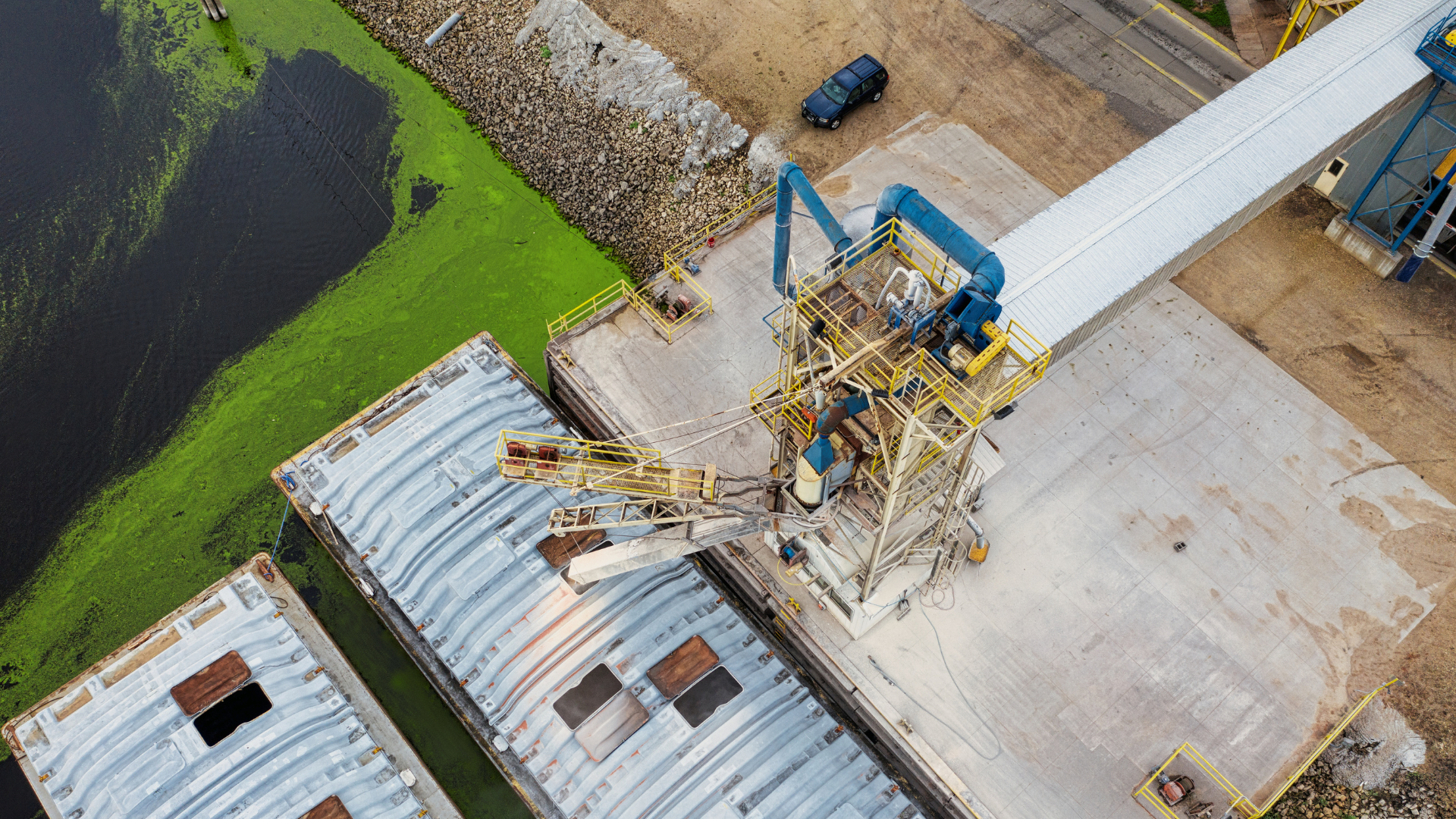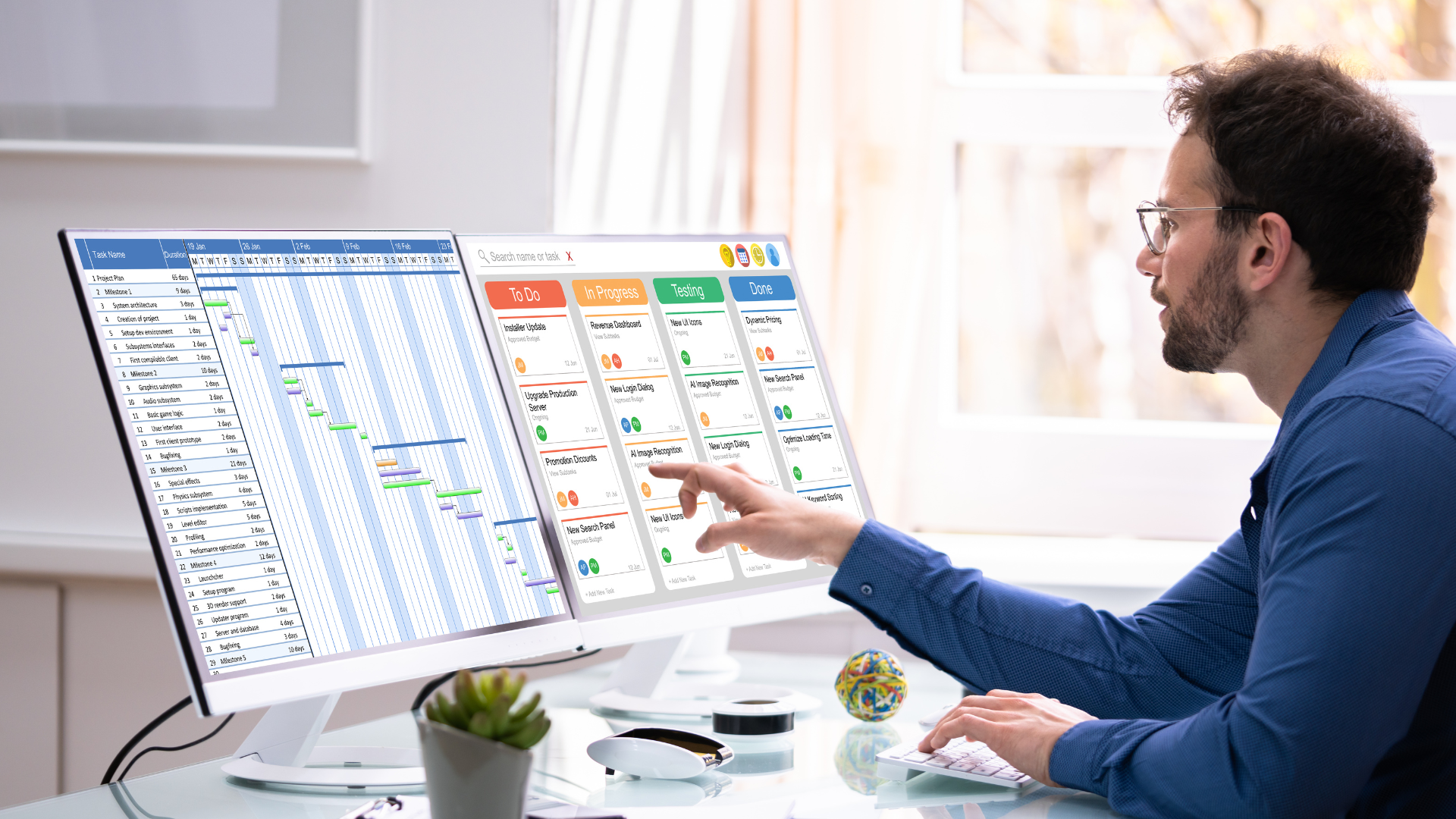Winning jobs in construction isn’t just about offering the lowest price anymore. Contractors today are expected to stay on top of client communication, manage bids efficiently, and follow up faster than ever.
The problem? Most of this gets lost in messy spreadsheets, scattered emails, or outdated tools. That’s where construction CRM software comes in.
A CRM built for contractors helps you organize bids, track every lead, and keep your follow-ups sharp, giving you a real edge when it comes to winning more jobs.
How a Construction CRM Helps Contractors Win More Jobs
If you’ve been in the construction industry for even a short while, you know how competitive winning bids can be. Margins are tight, deadlines are relentless, and clients expect quick, professional responses.
For contractors today, securing more jobs isn’t just about offering the lowest price. It’s about presenting yourself as organized, responsive, and trustworthy through effective construction workflows.
That’s where construction CRM software comes into play.
Unlike generic customer relationship management tools, a construction CRM is built specifically to address the challenges contractors face.
From managing leads to organizing bids, detailed project tracking, and maintaining strong client relationships, it provides structure and clarity in a business where things can easily fall through the cracks.
In this guide, we’ll explore how the right CRM software can directly improve your win rates by helping you manage follow-ups, keep track of client data, and organize your sales pipeline more effectively.
Key Takeaways
- Construction CRM software enables contractors to manage leads, bids, and projects from a single, integrated platform.
- Centralized client communication and automated reminders reduce missed opportunities.
- By improving organization, responsiveness, and collaboration, CRM software boosts bid success and long-term growth.
Understanding Construction CRM Software
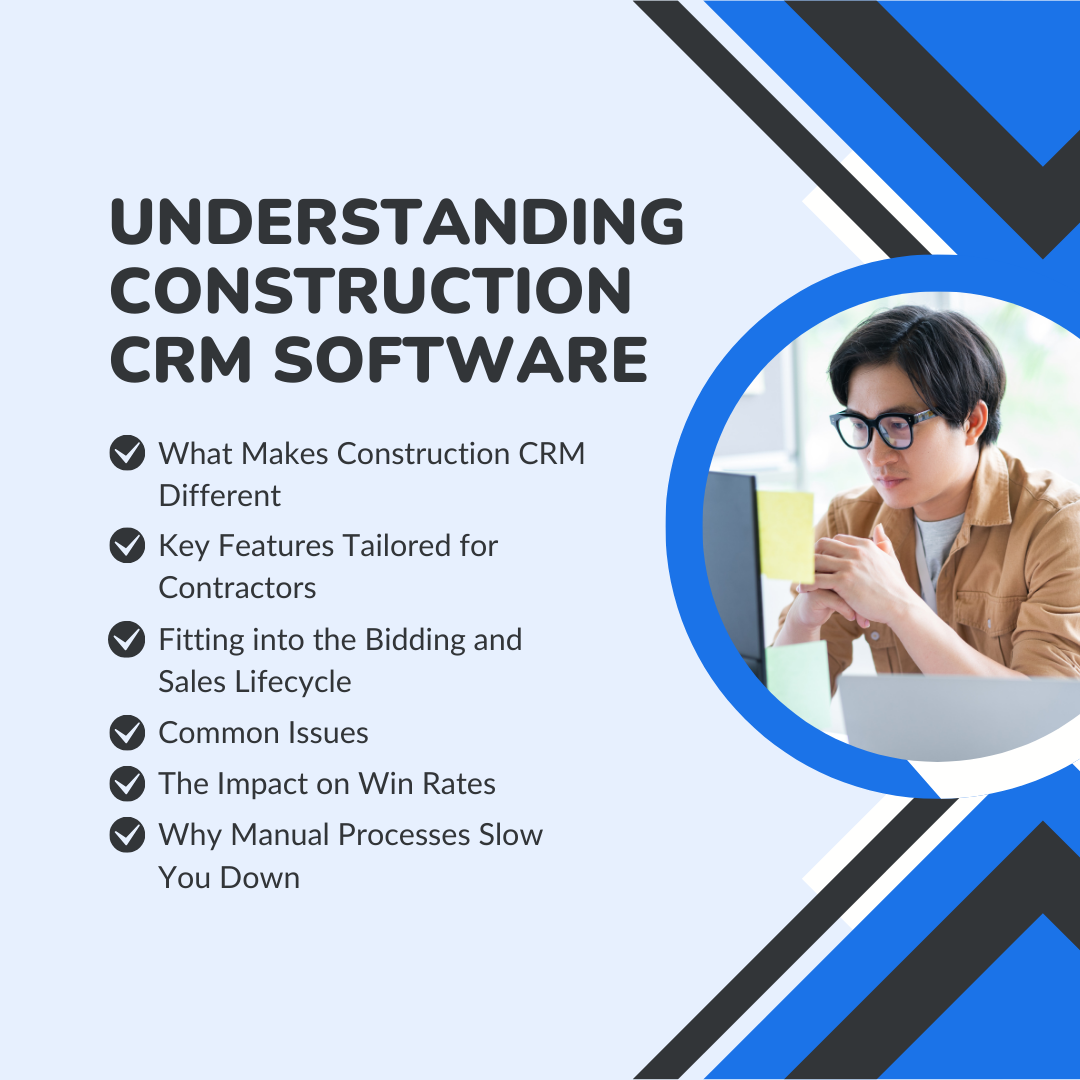
So, what makes construction CRM software different from a generic CRM? At its core, a CRM system is designed to manage customer data, sales pipelines, and communication. However, construction presents unique challenges that necessitate tailored solutions.
What Makes Construction CRM Different
Construction companies must simultaneously juggle complex bids, multiple projects, subcontractors, and clients.
A generic CRM may handle customer interactions, but it often falls short when it comes to project details, document management, and the need for role-based access across job sites and field teams.
A builder's pipeline CRM, on the other hand, is designed with these realities in mind for construction companies.
Key Features Tailored for Contractors
- Lead management: Every potential job matters, whether it comes from referrals, online searches, or repeat customers.
A construction CRM captures these leads automatically and keeps them organized so nothing slips through the cracks.
- Pipeline management: Instead of guessing where a deal stands, you get a clear visual of your entire sales pipeline.
You’ll know exactly which bids are pending, which proposals need follow-ups, and which deals are ready to close.
- Document management: From estimates to signed contracts and final invoices, a construction CRM stores everything in one place.
With version control, you’ll never waste time digging through emails or worrying about outdated files.
- Mobile access: Construction doesn’t happen at a desk. With a mobile-friendly CRM, your field teams can check client notes, upload job site updates, and communicate with the office, all in real time.
Fitting into the Bidding and Sales Lifecycle
Think of a construction CRM as the thread that ties your entire sales and project lifecycle together. From the very first phone call to the day you send the final invoice, it keeps the process organized and transparent.
Sales reps can set reminders for timely follow-ups, estimators can pull the right project data instantly, and general contractors can keep clients in the loop without endless back-and-forth.
In short, it helps you move faster, stay accurate, and build stronger relationships, all of which add up to winning more jobs. The Bid Management Challenge for Contractors
Winning bids are the lifeblood of any construction business. Yet many construction firms lose opportunities simply because their sales processes are disorganized and fail to track job progress.
Common Issues
Running a construction business without the right tools often feels like juggling with one hand tied behind your back.
When there’s no structured system in place, small mistakes can quickly snowball into lost jobs and frustrated clients. Here are some of the most common problems contractors run into:
- Lost leads: Imagine you get a call from a potential client while you’re on-site. You jot their number down on a scrap of paper, only to misplace it later.
Or maybe an email inquiry gets buried in your inbox. Without a CRM to capture and organize these leads, opportunities slip through the cracks, and once they’re gone, they usually don’t come back.
- Missed deadlines: Bidding is all about timing. Submitting proposals late, forgetting key documents, or overlooking details can instantly hurt your chances.
When you rely on sticky notes, notebooks, or scattered spreadsheets, deadlines become much harder to track, and it only takes one mistake to lose trust with a client.
- Unmanaged follow-ups: Following up is where many contractors lose potential jobs. If you don’t check in at the right time, chances are your competitor will.
Without automatic reminders and task tracking, it’s far too easy to forget a call or delay an email, and that silence can cost you the contract.
The Impact on Win Rates
These little slip-ups don’t just affect your workload; they directly impact how many bids you actually win. Every missed follow-up is essentially an open door for your competitors.
Clients notice when communication feels scattered or disorganized, and it makes them question how well you’ll handle their project.
On the flip side, contractors who stay organized and responsive earn trust quickly, which often makes the difference between winning or losing a job.
Why Manual Processes Slow You Down
Relying on spreadsheets and sticky notes is unsustainable, leading to increased manual data entry. Manual tracking wastes time, increases errors, and makes
scaling your business nearly impossible. A CRM helps eliminate repetitive tasks, allowing your team to focus on building strong client relationships instead of chasing paperwork.
To know why digitalisation is changing the world of construction, and Why Digital Tools Are Reshaping Construction in 2025.
How Construction CRM Software Organizes Your Bidding Pipeline
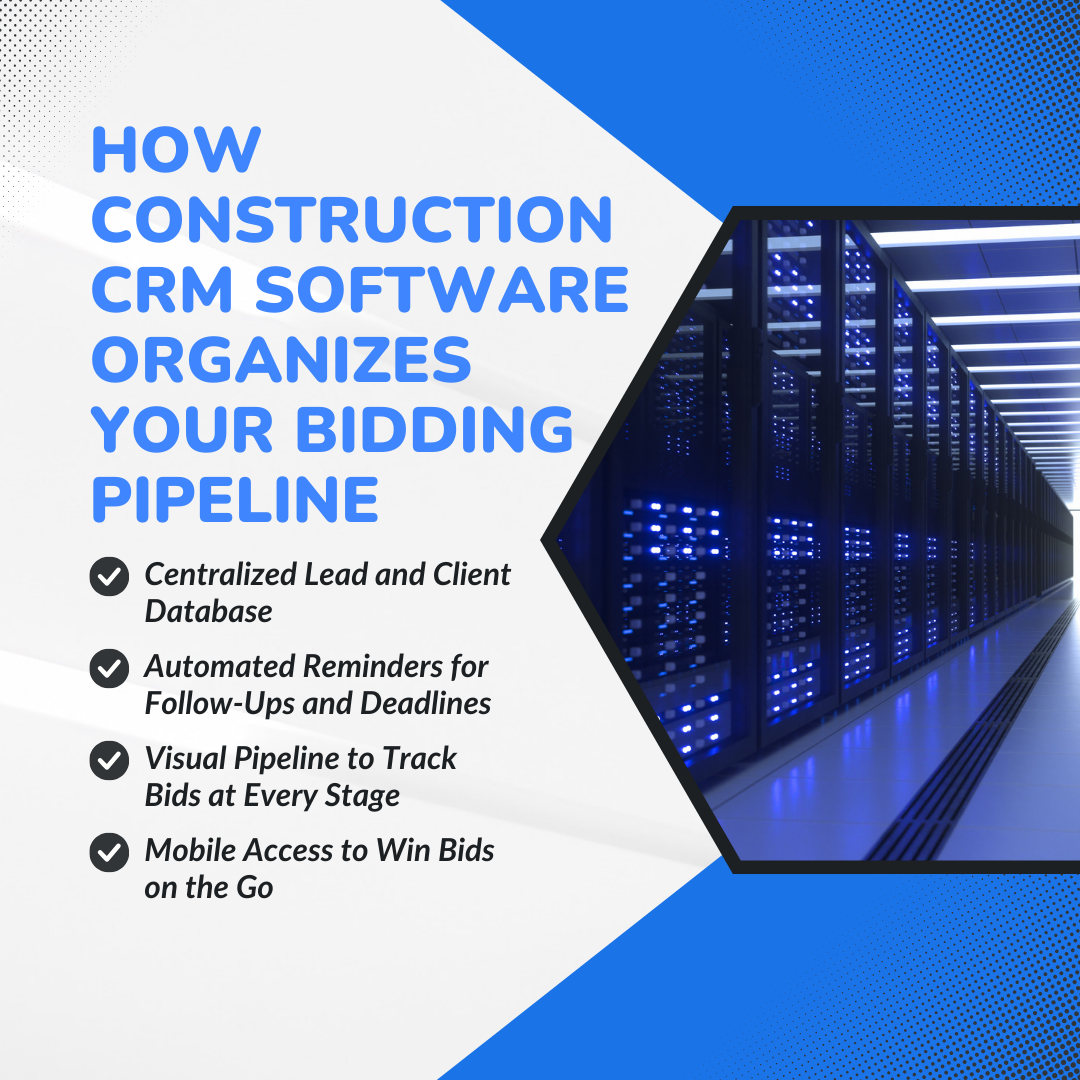
When you’re competing for more jobs, speed and organization are everything. A construction CRM provides a simple, visual way to manage your pipeline.
So, you always know where opportunities stand and what needs to happen next. Let’s break it down.
Centralized Lead and Client Database
Instead of having names and numbers scattered across spreadsheets, emails, and notebooks, a CRM brings everything into one place. That means you and your team always have the whole picture.
- All your leads, clients, and project details live in a single platform.
- You can instantly pull up past conversations, proposals, and contracts.
- Historical data helps you see what worked in the past, so you can improve your win rate moving forward.
- No more digging through inboxes or relying on memory; everything is organized and searchable.
Automated Reminders for Follow-Ups and Deadlines
One of the biggest reasons contractors lose bids is poor follow-up. A construction CRM ensures that this never happens by providing you with automated reminders.
- Get notified before proposal deadlines so you never miss your shot.
- Stay on top of follow-up emails and calls with scheduled reminders.
- Keep everyone on your team accountable by assigning tasks and setting due dates.
- Reduce stress by letting the system remember important dates for you.
Visual Pipeline to Track Bids at Every Stage
Having a clear pipeline view helps you instantly see where each opportunity stands. With a construction CRM, you’re not guessing you’re tracking.
- Easily visualize leads moving through the stages: new lead, proposal sent, negotiation, or contract signed.
- Identify bottlenecks in your sales process and address them promptly.
- See which deals are hot and need immediate attention.
- Share pipeline visibility with your whole team so no one is left in the dark.
Mobile Access to Win Bids on the Go
In construction, you’re rarely tied to a desk, and your CRM shouldn’t be either. Mobile access makes sure you can manage opportunities wherever you are.
- Update client details and notes directly from the job site.
- Access proposals, contracts, and communication history while meeting with a client.
- Capture new leads on the spot instead of waiting until you’re back in the office.
- Keep your field teams in sync with real-time updates, regardless of their location.
Just stay updated and see how AI is also making a big difference in construction: The Rise of AI in Construction Project Management.
Core Features of Construction CRM That Help You Win More Bids
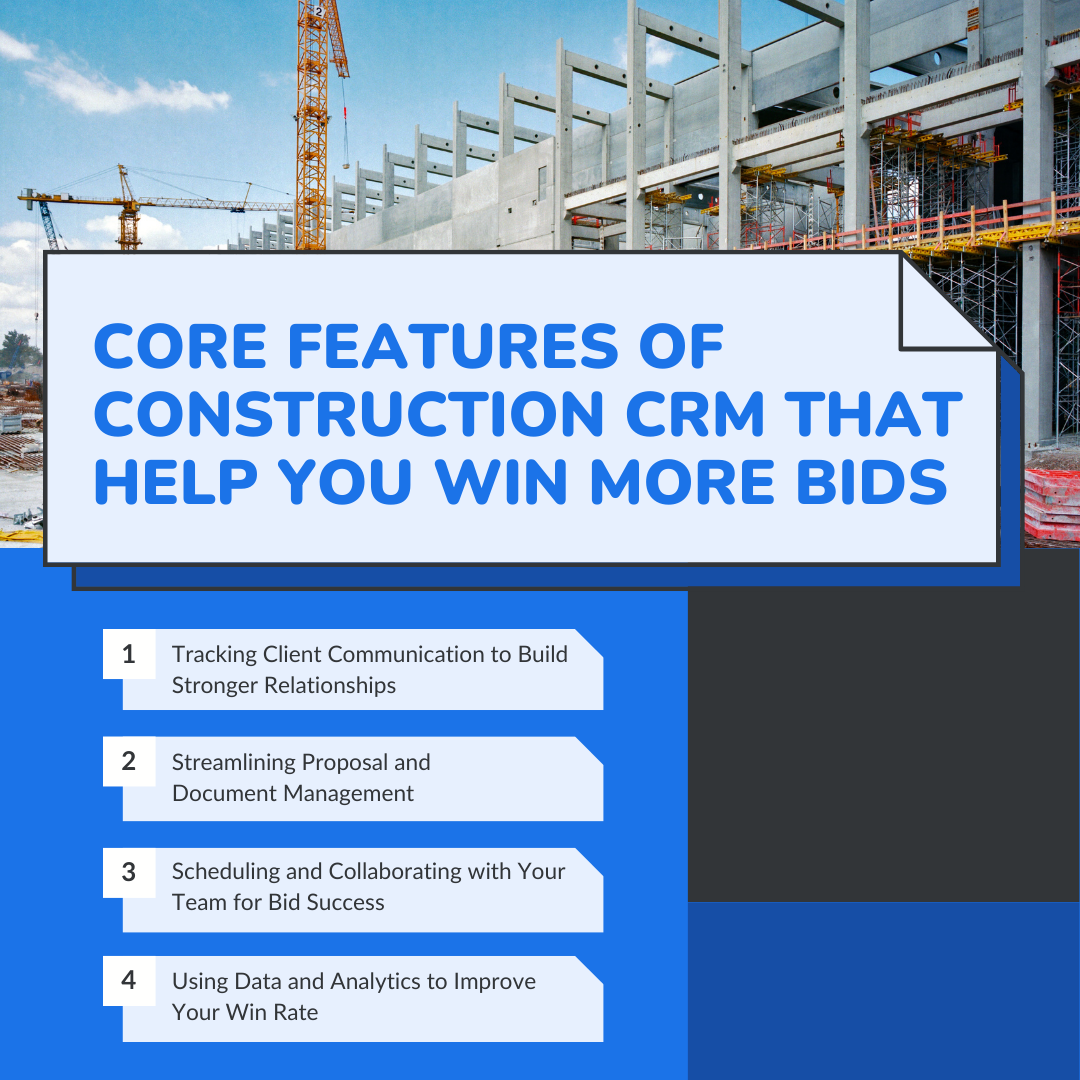
Winning more jobs isn’t just about offering the lowest price; it’s about being more organized, responsive, and professional than your competitors. That’s where construction CRM software comes in.
With the right tools, you can maintain clear communication, manage proposals efficiently, and utilize data to refine your strategy. Let’s look at the essential features that make the biggest difference.
1. Tracking Client Communication to Build Stronger Relationships
Keeping communication organized is one of the most powerful ways to win jobs. A construction CRM consolidates all conversations, emails, and notes in one centralized location. When a client calls, you’re not scrambling to remember project details; you already have them on hand.
Personalized follow-ups can also be automated, ensuring your communication feels timely without requiring extra work. Clients notice when contractors respond quickly and consistently, which strengthens trust.
Example: A general contractor using CRM software might set up automatic reminders to check in weekly during the bid review process. That consistent communication could make the difference in landing the job.
2. Streamlining Proposal and Document Management
Construction projects generate a mountain of paperwork. Proposals, contracts, change orders, and final invoices must all be tracked and managed. A construction
CRM eliminates the chaos by storing everything in one secure location, supporting project management .
- Easy sharing with clients and team members.
- Version control to avoid confusion over outdated documents.
- Integration with estimating tools and e-signature platforms to speed up approvals.
By reducing errors and ensuring everyone has access to the latest documents, you not only save time but also present yourself as more professional.
3. Scheduling and Collaborating with Your Team for Bid Success
Winning bids are rarely a one-person job. Estimators, project managers, and sales reps all need to contribute. A construction CRM connects everyone with real-time updates.
Instead of chasing email threads, tasks can be assigned with clear deadlines. Project planning becomes smoother when sales reps and project managers share the same dashboard. This collaborative approach eliminates silos and increases productivity.
4. Using Data and Analytics to Improve Your Win Rate
You can’t improve what you don’t measure. CRM software tracks key performance metrics like:
- Bid conversion rates
- Average time to close deals
- Effectiveness of follow-up tasks
By analyzing this data, contractors can identify bottlenecks, refine their sales process, and even forecast revenue. Customizable dashboards provide insights that go beyond gut instincts, allowing firms to make smarter business decisions.
57% increase in sales revenue on average for firms using a dedicated construction CRM compared to generic CRMs
Scalability: Growing Your Construction Business with CRM
As your construction business grows, so do the challenges. More leads, multiple projects, and expanding teams make manual systems even more unmanageable. A construction CRM scales with your needs.
Customizable workflows: You can adjust the CRM to match the way your company works, whether you’re a small contractor or managing multiple crews on big projects.
Integrations: Connect the CRM with accounting tools, project management platforms, or even online payments, so all your business processes flow smoothly in one place.
Support for multiple revenue streams: Whether you’re handling residential jobs, commercial builds, or specialty projects, the CRM keeps everything organized under one system.
By creating a single platform for your entire business, CRM helps construction firms handle growth without losing efficiency.
Choosing the Right Construction CRM Software
Not all CRM solutions are created equal. Choosing the best construction CRM depends on your specific needs.
Factors to Consider
- Size of your business and number of users: A small contracting team won’t need the same features as a large construction firm with dozens of employees logging in daily.
- Complexity of your projects: If you manage multi-phase builds or commercial projects, you’ll need stronger tools than a contractor focused only on small residential jobs.
- Need for mobile access for field teams: Your crews spend more time on-site than in the office, so a CRM that works well on mobile keeps everyone connected.
- Integrations with existing project management or accounting software: Look for a CRM that talks to the tools you already use, so you don’t waste time jumping between platforms.
Key Features Checklist
- Lead management: Keep all prospects organized in one place so you can track every opportunity from the first call to the signed contract.
- Pipeline management: A clear visual pipeline shows the status of each bid or project, making it easy to identify bottlenecks.
- Document management: Store proposals, contracts, and permits in one centralized hub to prevent loss or obsolescence.
- Automated reminders: Never miss a follow-up or deadline again with built-in alerts that keep your team on track.
- Mobile app for job site access: Update project details or check client info right from the field without waiting until you’re back in the office.
- Customizable dashboards: Tailor your view to focus on the metrics that matter most, whether it’s bids won, revenue forecast, or project status.
Questions to Ask Vendors
- How does your CRM handle multiple projects?: Make sure it can manage overlapping jobs without creating confusion or clutter.
- Can it support role-based access for sales reps and project managers? Different team members need different levels of access to keep data secure and organized.
- What level of customer support do you provide during setup? A good CRM vendor should help you onboard smoothly and be available for troubleshooting when needed.
25.10% of construction firms worldwide have adopted client relationship management solutions as of 2025.
Implementation Best Practices for a Smooth Transition
Switching to a new CRM may sound like a daunting task, but if you approach it step by step, the transition can be smooth and stress-free. The goal is to get your team comfortable with the system so it becomes a natural part of daily work.
Preparing Your Team
Before rolling out the software, ensure your team understands the reason for the switch. Explain that the CRM isn’t just another tool to learn; it’s designed to cut down on repetitive tasks, keep leads organized, and save time in the long run.
When people see how it makes their work easier, they’ll be more open to adopting it.
Data Migration Tips
One of the most crucial steps is preparing your data. Instead of dumping everything into the new CRM, take some time to clean up the data.
Remove duplicate entries, correct errors, and delete outdated contacts that are no longer relevant.
Starting with clean, accurate data means the system will feel organized from day one and prevent confusion later.
Training and Change Management
Even the best CRM won’t work if people don’t know how to use it. Set aside time for hands-on training so that your sales representatives, project managers, and field crews all become familiar with the system. Please encourage them to ask questions and share feedback.
Most importantly, push for consistency when everyone uses the CRM in the same way, it quickly becomes second nature and an integral part of your daily workflow.
ROI of Using Construction CRM Software
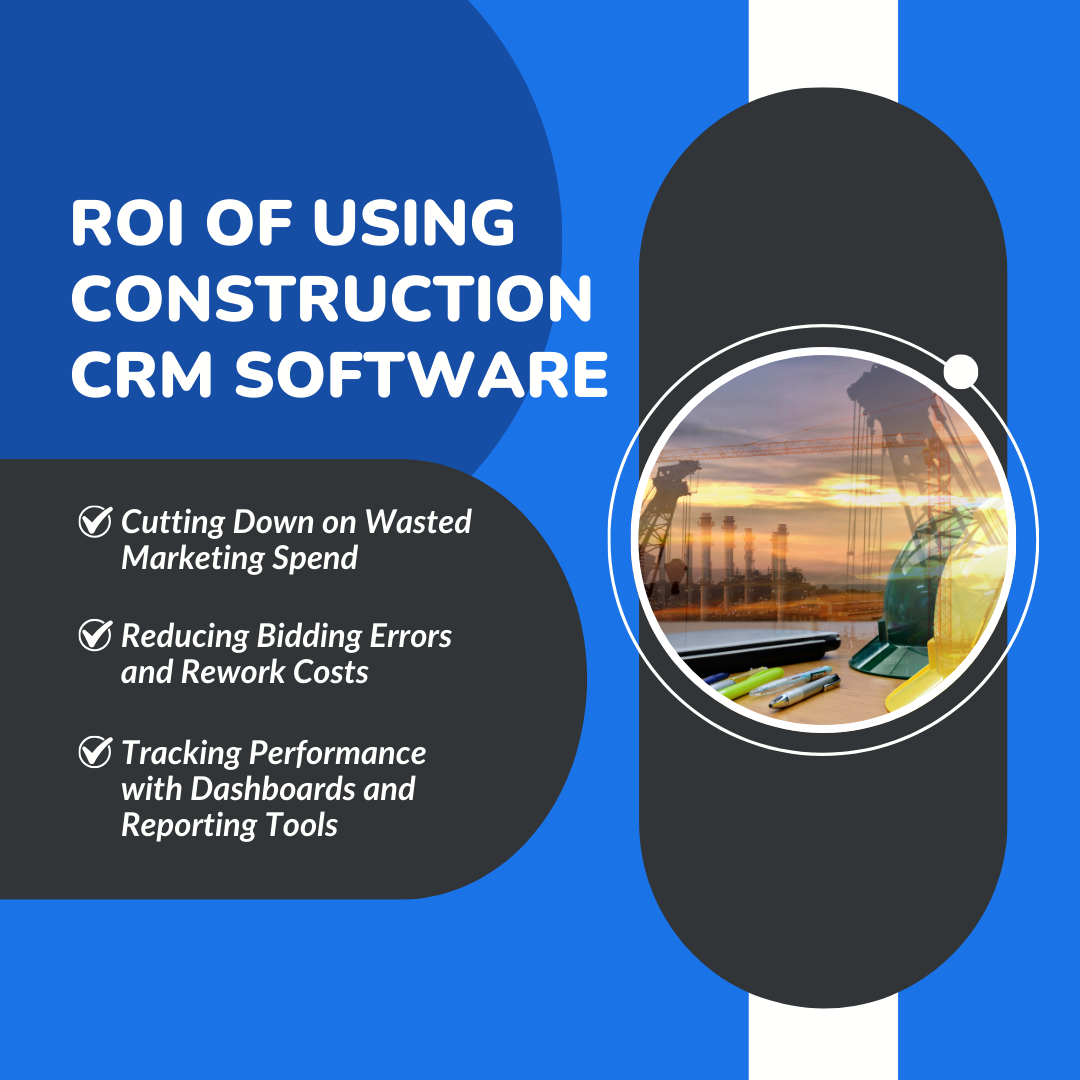
The proper construction CRM isn’t just another tool on your expense sheet; it’s an investment that quickly pays for itself by saving money, reducing mistakes, and helping you win more jobs.
Cutting Down on Wasted Marketing Spend
- A CRM tracks where your leads are coming from and shows how they convert into real projects.
- This helps you focus marketing dollars on the channels that actually bring results.
- Over time, you save money by cutting out campaigns that don’t perform.
Reducing Bidding Errors and Rework Costs
- All proposals, contracts, and deadlines stay organized in one place.
- Automatic reminders prevent missed follow-ups or forgotten documents.
- Fewer errors and less rework protect your profit margins and your reputation.
Tracking Performance with Dashboards and Reporting Tools
- Custom dashboards give you real-time visibility into your sales pipeline and project progress.
- You can track bid success rates, lead conversions, and deal timelines without guesswork.
- These insights make it easier to spot bottlenecks early and plan for steady growth.
Common Mistakes to Avoid with Construction CRM
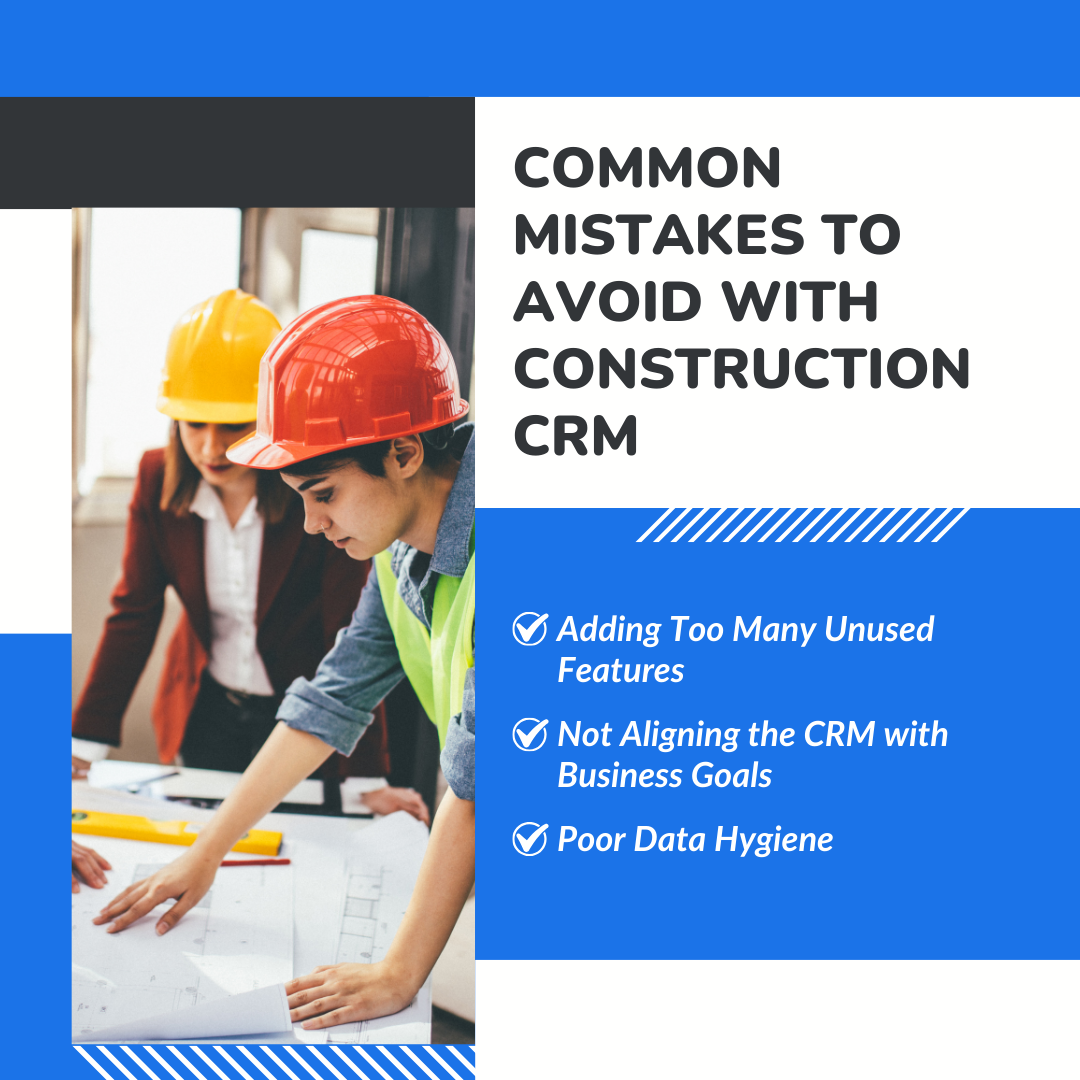
While CRM helps streamline processes, mistakes during setup or usage can limit its benefits.
Adding Too Many Unused Features
- It’s tempting to pick a CRM with every feature under the sun, but if your team doesn’t use them, it just creates clutter.
- Overloading the system with unnecessary tools makes it harder for your staff to focus on the essentials, such as tracking leads and managing projects.
- A more innovative approach is to start with the features that address your biggest pain points and then add more as your team becomes more comfortable.
Not Aligning the CRM with Business Goals
- A CRM only works if it’s tailored to your business needs. If you’re not clear about your goals, whether it’s improving lead follow-ups, winning more bids, or tracking project progress, the system won’t deliver the results you expect.
- Instead of copying how other companies use their CRM, take the time to map out your own workflows and ensure the setup supports your objectives.
Poor Data Hygiene
- A CRM is only as effective as the data it contains. If your team forgets to log client calls, skips entering emails, or allows contact lists to become messy, the system quickly loses its value.
- Outdated or incomplete information leads to missed opportunities and wasted time.
- Setting simple rules for consistent data entry and regularly cleaning up your database will keep your CRM running smoothly.
Why ConstructionBase Is the Ultimate Construction CRM Software to Help Contractors Win More Jobs
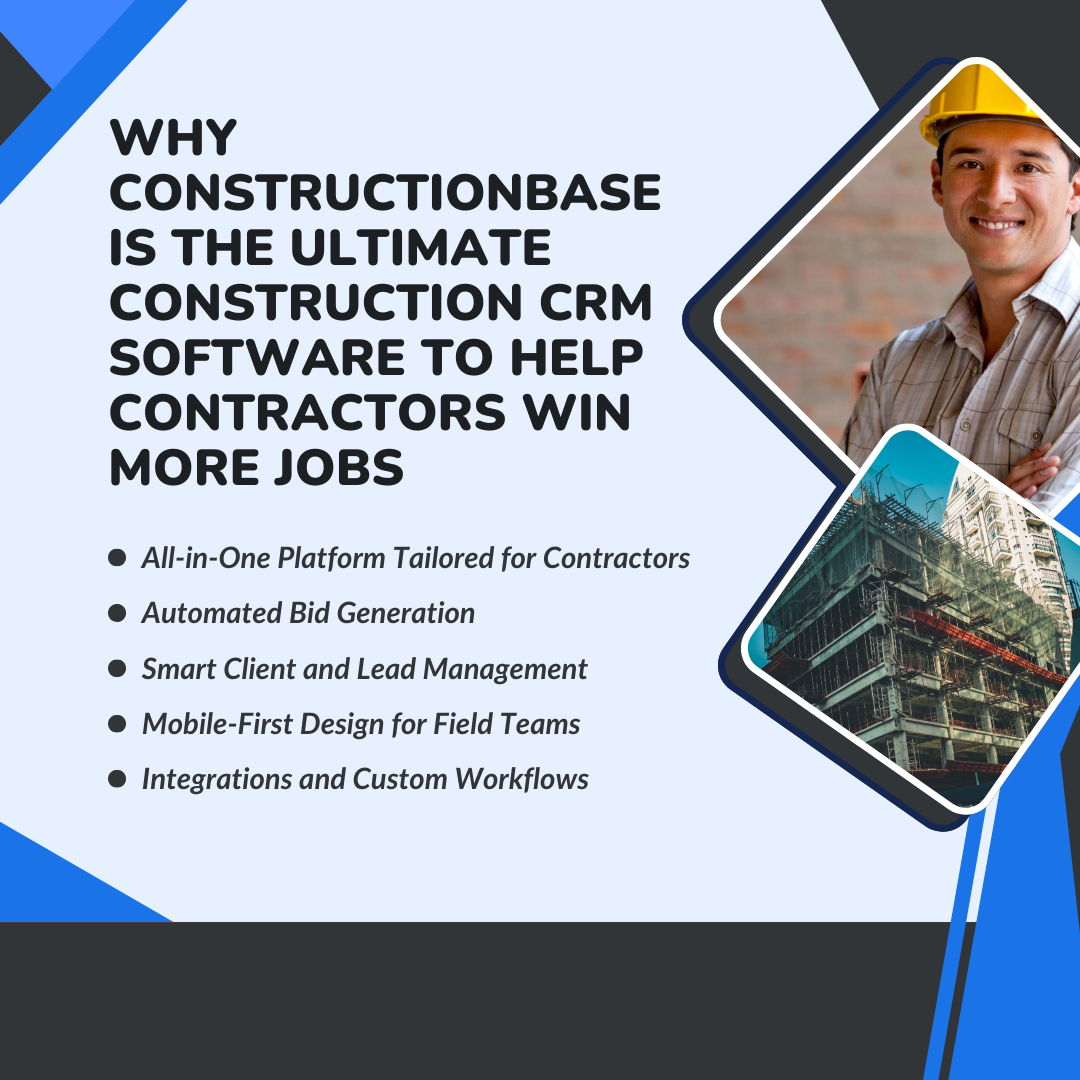
At Constructionbase, we’ve built a CRM solution designed specifically for construction companies. It’s more than just customer management; it’s a complete system for handling your entire project lifecycle.
All-in-One Platform Tailored for Contractors
Instead of juggling multiple tools, Constructionbase brings everything into one place. From the first lead inquiry to the final invoice, you can manage the entire construction process inside a single platform.
This makes it easier for your team to stay organized, save time, and focus on what matters most: winning jobs and keeping clients happy.
Automated Bid Generation
Bidding is one of the most time-sensitive parts of contracting. With Constructionbase, you can generate accurate proposals in minutes instead of hours.
The system reduces manual errors, maintains consistent pricing, and helps you meet tight deadlines, giving you a professional edge that impresses potential clients.
Smart Client and Lead Management
Leads slipping through the cracks can cost contractors valuable jobs. Our CRM streamlines the process of capturing new leads, tracking them through your sales pipeline, and maintaining clear communication with prospects.
Once they become clients, you can continue to manage relationships seamlessly, ensuring that follow-ups are never missed.
Mobile-First Design for Field Teams
Construction doesn’t happen behind a desk. With our mobile app, your field crews, project managers, and sales reps can access the CRM anywhere.
Whether they’re on-site, at a client meeting, or traveling between jobs, they’ll always have the latest updates and project details in their pocket.
Integrations and Custom Workflows
Every construction business has its own way of working, and ConstructionBase adapts to yours. The CRM integrates easily with accounting software, project management tools, and even online payment systems.
Additionally, you can customize workflows to match your exact business needs, creating a setup that truly supports your operations instead of forcing you to make adjustments.
Conclusion
Construction CRM software is one of the most powerful tools contractors can adopt to win more jobs. By focusing on client tracking, consistent follow-ups, and better bid organization, it creates measurable improvements in win rates and team performance.
Start small, measure your wins, and scale your CRM use as your construction business grows. The right CRM doesn’t just help you win more bids; it gives you the confidence to manage projects, impress clients, and grow revenue.
Ready to Win More Bids with ConstructionBase?
Stop juggling spreadsheets and missing out on projects. With Constructionbase, you can organize bids, track clients, and close more jobs with less effort. Try it today and see the difference for yourself.
FAQs
1. What is a construction CRM?
A construction CRM is customer relationship management software built specifically for the construction industry to manage leads, projects, client communication, and the sales process.
2. How does a construction CRM help contractors win more jobs?
By organizing the sales pipeline, tracking client communication, automating reminders, and enhancing team collaboration, contractors can submit more bids and close deals more quickly.
3. Can a CRM integrate with other project management tools?
Yes, the best construction CRM platforms integrate with project management tools, accounting software, and communication tools to streamline processes across the entire business.
4. Is a CRM useful for small construction companies?
Absolutely. Whether you’re a home builder or a growing construction firm, a CRM helps reduce errors, track projects, and maintain stronger client relationships.
Have questions or need personalized advice?
Talk to an Expert Today and let our construction specialists guide you to success.


